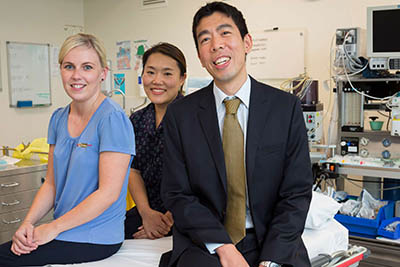 This article originally appeared in our December 2014 St Andrew’s Best Practice Newsletter – read the full issue here.
This article originally appeared in our December 2014 St Andrew’s Best Practice Newsletter – read the full issue here.
St Andrew’s War Memorial Hospital welcomes Dr Sunny Lee, Interventional Gastroenterologist, in leading the introduction of an ERCP (Endoscopic retrograde cholangiopancreatography) service within the onsite endoscopy unit.
After graduating in Medicine from Monash University in 2004, Dr Lee completed his gastroenterology training at Monash Medical Centre in Melbourne, before commencing his sub-specialty training in interventional endoscopy at Concord Hospital in Sydney. He subsequently undertook an advanced endoscopy fellowship in ERCP, EUS and Interventional Endoscopy at the University of British Columbia in Vancouver, Canada.
As an Interventional Gastroenterologist, Dr Lee specialises in advanced diagnostic and therapeutic endoscopic procedures. His clinical interests are focussed on the management of pancreatic lesions and pancreaticobiliary diseases, ERCP, endoscopic ultrasound (EUS), advanced endoscopy and colonoscopy coupled with general gastroenterology.
Dr Lee provides a comprehensive gastroenterology inpatient service at St Andrew’s with his private practice based at Paddington Medical Rooms in conjunction with Drs David Hewett and James Daveson. Dr Lee holds the role of Consultant Gastroenterologist at the Queen Elizabeth Jubilee II Hospital and recently performed the first successful EUS FNA (Endoscopic Ultrasound Fine Needle Aspiration) procedure at the hospital in August 2014. ERCP has continued to evolve over the last twenty years.
With the advancement of alternative diagnostic modalities and EUS, ERCP is now almost exclusively a therapeutic procedure. ERCP remains the mainstay of managing stones and obstruction within the bile ducts and pancreatic duct. The procedure also serves as an important adjunct therapy for surgeons performing cholecystectomies where retained stones or bile leaks may be an issue post operatively. To ensure that ERCP is the most appropriate procedure, all available diagnostic and treatment options are explored prior to the decision being made to perform ERCP as serious risks are associated such as pancreatitis.
Dr Lee states, “We are now much more selective about when we perform ERCP’s. Being also trained in EUS allows me to select the patients that will not only benefit most from the procedure but also prevent unnecessary complications.” Referral pathways include General Practitioners referring patients presenting with pancreatic lesions that require diagnosis, jaundice for investigation, deranged liver function tests, and resultant imaging that raises concern pertaining to a potential bile duct, pancreatic obstruction or lesion. Fellow gastroenterologists often refer patients requiring interventional endoscopic treatment and further management of complicated hepatopancreatobiliary conditions.
In addition to Dr Lee’s passion for ERCP practice, his extensive training enables him to undertake alternative therapeutic endoscopic procedures. These include upper gastrointestinal (GI) procedures, colonic stenting for obstructive lesions, dilatation of GI tract strictures, closure of GI tract defects and removal of large colonic polyps.
Dr Lee explains that he considers the clinical story paramount to any procedure being performed and ensures informed decisions are undertaken in the best interests of the patient. He continues, “Having a collaborative partnership between the patient’s GP and specialist provides for optimal treatment outcomes and I’m always happy to discuss any queries or concerns in advance of a referral”.
Dr Lee concludes, “The procedures are technically challenging and our endoscopy team is confident in carrying them out with high quality results for patients. The most important aspect is in the planning and preparation prior to undertaking an ERCP procedure, albeit with some of the most challenging ERCP decisions I have made resulting in the decision not to proceed when alternative options to successfully resolve presenting issues have been utilised.”
Pictured (From Left): Endoscopy nurses Aishling Bourke & Honey Kim with Dr Lee in St Andrew’s Endoscopy Unit